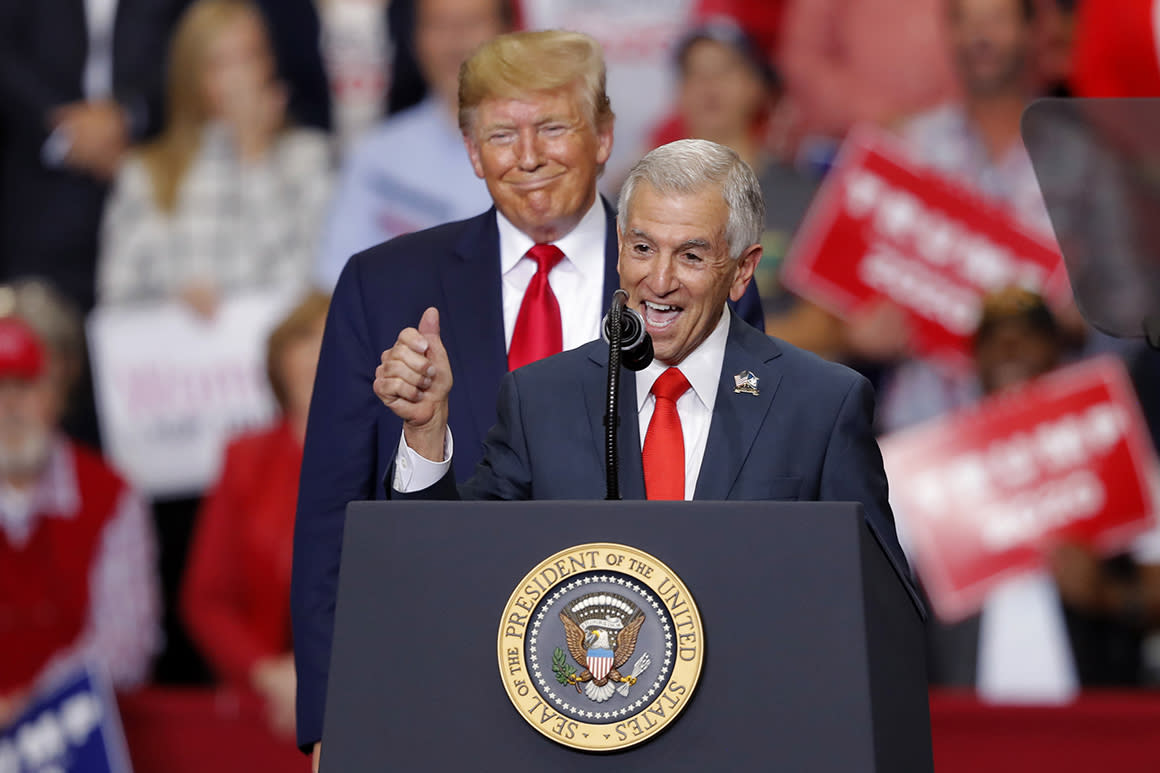Trump races to avoid a second electoral debacle in Louisiana

Donald Trump couldn't save Matt Bevin in Kentucky. Now, the pressure is on the president to avoid a second black eye in Louisiana next week.
Trump is thrusting himself into the state’s gubernatorial contest: He held a Wednesday evening rally for Republican candidate Eddie Rispone, who is trying to unseat Democratic Gov. John Bel Edwards, and will make another visit two days before the Nov. 16 election. The president is also expected to record get-out-the-vote videos and robocalls, and on Wednesday morning he called into a popular Louisiana morning radio show to talk about the race.
Trump also plans to attend the Louisiana State vs. Alabama college football game on Saturday. Though the game is at Alabama, the marquee match-up is certain to draw wide viewership among Louisianans.
The blitz underscores the importance of the race to the president. Trump has been heavily focused on the Kentucky, Mississippi and Louisiana gubernatorial contests this fall, gambling that a sweep would bolster his political standing in the face of impeachment and heading into 2020.
But with Bevin’s apparent defeat on Tuesday, Trump’s political team acknowledges he's under intense pressure to avoid a similar outcome in Louisiana.
Republican strategist Alex Castellanos, who has worked on an array of gubernatorial races, pointed out that Tuesday’s results weren’t all bad for the president, noting that the party swept Kentucky’s other statewide contests.
But “Trump’s problem," Castellanos said, "is that a loss is still a loss.”
“Now Louisiana is the tie-breaker and Trump has put his name on the ballot,” he said. A defeat would mean that “Trump will have lost two out of three states he won big” in 2016.
The president has come to to relish the idea of unseating a Democratic incumbent. Over the past week, he's sent out a stream of tweets lavishing praise on Rispone and knocking Edwards. Trump has also peppered aides and allies with requests for updates on polling and other developments in the race.
“We’ve talked about it, and he’s very interested in how he can help,” said House Minority Whip Steve Scalise (R-La.), a close Trump ally.
Trump's aides recognized ahead of time that the president's decision to go so far out on a limb in the trio of races meant he would bear the brunt of blame for any loss. Kentucky and Louisiana were the riskiest bets: Bevin has been among the most unpopular governors in the country, while the centrist Edwards, seeking a second term, is seen as formidable.
But Trump's political team calculated that the president would be seen as the culprit whether or not he got involved. And if he managed to help the Republicans win, it would dramatically boost his political capital and allow him to argue that impeachment isn't damaging him going into the election.
Those involved in the Louisiana race credit Trump, who won the state by nearly 20 points in 2016, with helping to narrow the gap against Edwards. Public and private polling has shown a close race.
Louisiana Attorney General Jeff Landry, who is spearheading a pro-Rispone super PAC, said Trump’s rally ahead of the October primary helped keep Edwards under the 50 percent threshold that he needed to avoid a November runoff.
“I can tell you, I think he has an opportunity to make a huge difference in the race,” Landry said in an interview. “Quite honestly, I don’t know that we can turn the numbers we need to turn without him.”
White House officials are carefully orchestrating the president’s Louisiana push. They chose to hold Wednesday’s rally in Monroe, a city in the northern part of the state. The decision was made partly at the urging of GOP Rep. Ralph Abraham, who ran against Rispone in the primary opponent and represents the area in Congress. With Abraham not on the ballot, Republican officials worried that voters in the area might not turn out for Rispone.
Trump used the Wednesday rally to savage Edwards as a “failed governor” who is ideologically out of step with the conservative state.
“This is Louisiana,” Trump told the crowd. “How did you get a liberal Democrat to be your governor?”
It is not just Republicans who are taking a closer look at the Louisiana contest. National Democrats say they are increasingly optimistic about the Louisiana race following the Kentucky outcome and are considering increasing their investment in the state.
Bevin’s defeat “shows me that the president’s coattails can’t push someone over the finish line, and the fact that he’s going to campaign in Louisiana — I’m not scared,” said Rhode Island Gov. Gina Raimondo, the Democratic Governors Association chairwoman.
Raimondo declined to say how much more her organization would invest but said: “We have plenty of money” and would spend whatever needed “to get over the top.”
Republicans are also considering increasing their spending. To date, the Republican Governors Association has poured in $5.5 million, while its Democratic counterpart has spent around $7 million.
Billy Nungesser, the state’s Republican lieutenant governor, said he was struck by the frequency of Trump’s recent visits to the state. But Nungesser said Trump’s activity in the race could have unintended consequences, mobilizing liberals who dislike him.
“I meet the people that follow the president and you see at the rallies, and those Republicans that only vote Republican are gonna be there for Rispone,” Nungesser said. “So I don’t know how much influence it has or doesn’t have. It sure didn’t work in Kentucky.”
As to whether Trump’s presence at the Saturday college football game could draw out voters for Rispone, Nungesser joked: “It depends on whether he’s wearing Alabama or LSU clothes.”

